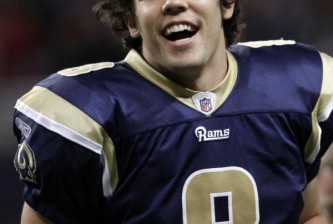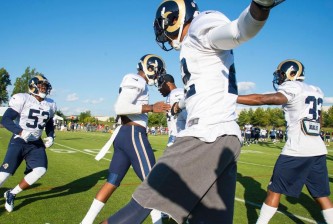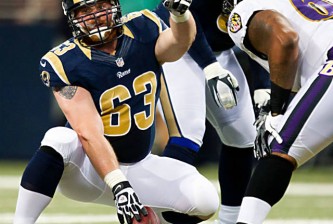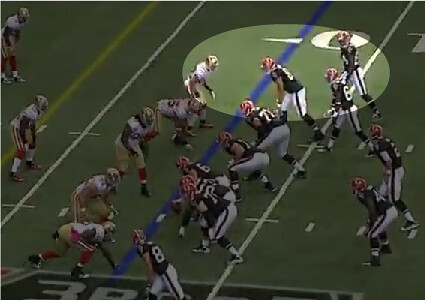I feel a flashback to freshman year in college coming on…
Honestly, I had plans to work hard all week on this assignment, really I did. First matchup of the second half, first of four crucial divisional games that will decide the Rams’ playoff fates, it’s a big deal, you don’t have to tell me that. But you know how it goes, dude, sometimes life just gets in the way, you know? So anyway, here I am, studying and writing at the last possible moment, pulling an all-nighter. I’ve got a bunch of bananas, supposed to be good brain food and all that, a pot of coffee brewing up, my dual cassette deck set up with the Chili Peppers and Fishbone, and bootleg 49ers VHS video cued up and ready to go. So here goes…
Okay, so 18 years later game film streams live on the internet, Pandora replaces my tape deck, and the “life” that got in my way revolves around a day job and a couple of kids rather than a deep level metaphysical search for my true self (in other words, getting dumped). But the feeling of being late on an assignment still burns, so let’s get started.
I chose two games to look at. To highlight their Troy-Smith-led offense, I cued up their last game, a win in London over an increasingly threadbare Denver Broncos team, which I will focus on in my next post. To profile their defense, I wanted to look at the most similar offensive team to the Rams … Week 4’s matchup against the Atlanta Falcons. (While we don’t have a Roddy White or a Tony Gonzalez, we do have a similar offensive philosophy and set of complementary weapons at receiver, running back, and a heavy feature on the tight end position.)
49ers on Defense: Notes vs Atlanta
-
Mixed fronts are the norm, but true blitzes are not. Right out of the gate, San Francisco set out to atone for allowing a league-worst 87 points in the first three weeks. They mixed their defensive looks very effectively, often pretending to a 4-man front from their 3-4 defense, and playing a lot of smart zone coverage to take away short passes.
On obvious run downs versus Michael Turner, the Niners’ base package didn’t “stack the box,” but a patient three- or four-man blockade at the line, and a hungry set of linebackers ready to pounce on anything that moved through the hole. And when it came time to rush the quarterback, free safety Dashon Goldson found easy lanes from the slot position.
The strategy worked very well early, as the Niners forced the Falcons to punt twice on their first two drives, and turned both into touchdowns (one on a long drive, the other on a brilliant blocked kick recovery by Taylor Mays) for an early 14 point lead. That said, the Falcons did little to attack or redirect the defense, using almost no pre-snap motion and letting the Niners be the aggressors at first. Their most successful plays in the early going were screen plays, the neutralizing tai chi counter attack versus an aggressive front seven.
-
A 14-point lead and a chip on their shoulder turned into serious handicaps. The Niners’ defense seems very much a reflection on their head coach — physical, intense, and utterly insecure.
Once the red and gold felt the tide turning in their favor early on, on the road against a superior opponent no less, the team lost all semblance of discipline in the quest for (Mortal Kombat voice) TOTAL DOMINATION. Rather than wrap up and make easy tackles, they revved up for “jacked-up” hits … and often missed.
The Falcons didn’t have to resort to any trick plays or desperate measures, despite falling down two touchdowns in the first ten minutes. They simply ground out yards and drives over the remaining fifty minutes of game play, and kicked the go-ahead field goal with two seconds left in the game. Notably, defending Atlanta’s final nine drives, the Niners vaunted high-energy, high-intensity defense only forced two three-and-outs.
-
The Falcons’ lone touchdown came courtesy of a blown coverage. Facing a third and five in the red zone, Atlanta bunched three receivers to the right, with Harry Douglas shadowing Tony Gonzalez in the slot. Inexplicably, the Niners only lined up two defenders in coverage, and rushed one of those, playing their traditional zone.
Maybe you can call this high-risk/high-reward defense, but if your play design leaves a guy wide open five yards in front of the end zone on Matt Ryan’s strong side, that play needs to be torn out of the book. More likely, though, it was a blown call, followed by a blown non-timeout to fix the blown call. Symptomatic of a team whose season has been characterized by finding ways to beat themselves.
Rams reaction
On offense, I wouldn’t expect either the straight-ahead run game or play-action passing to be particularly effective, as this Niners defense is not one that bites on the run until it reaches the line of scrimmage. However, the Niners’ patience on running downs means that Steven Jackson and Ken Darby both could be heavily utilized on screen plays that allow the Rams’ linemen to get into the second level, taking the pursuit-oriented linebackers out of action, should be a good way to grind out yards without actually “pounding the rock.”
Sam Bradford is going to have his hands full in the video room looking at all the fronts that the Niners use out of the 3-4; but with two weeks to prepare and two full seasons of Singletary-coached defenses to look at, I bet he’ll be able to sniff out enough mismatches to make a few game-changing plays.
The key for both quarterback and receivers will be finding holes in the secondary’s zones, finding and exploiting those handoff points, particularly outside the hashes. This is where the strategic signing of former Niners safety Michael Lewis could be invaluable from a preparation standpoint.
“Yeah, he’s helped me out a little bit,” says Steven Jackson. “I won’t share it with you guys, but he’s definitely told me some things that (the 49ers) feel when they get ready to face us — in particular me, myself — how they would like to approach the game plan and things like that.”
























